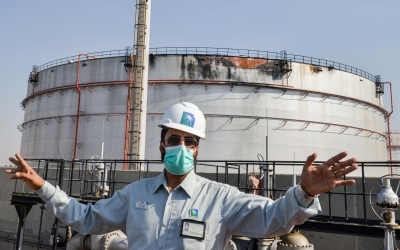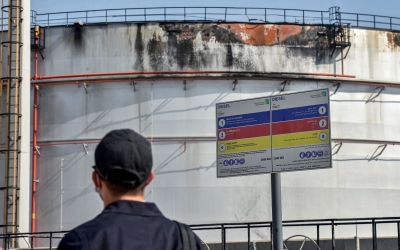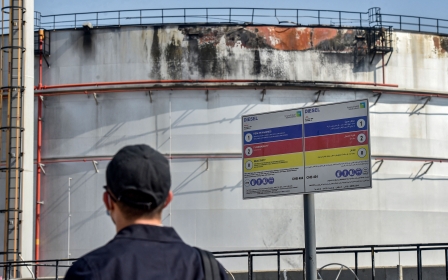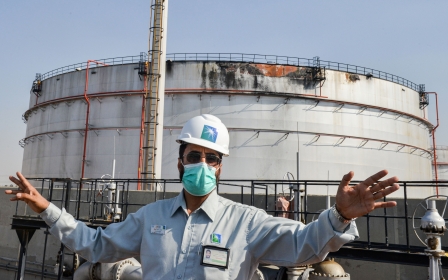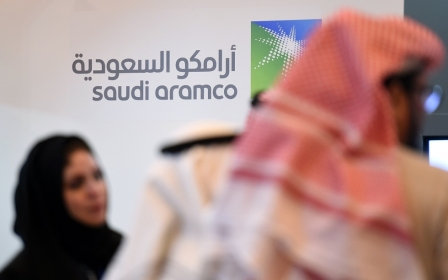Saudi Aramco's 2020 profits plummet on lower crude prices
Energy giant Saudi Aramco on Sunday posted a 44.4 percent slump in 2020 net profit due to lower crude prices, as the coronavirus pandemic weighed heavily on global demand.
Aramco, Saudi Arabia's cash cow, has revealed consecutive falls in profits since it began disclosing earnings in 2019.
The falls have piled pressure on government finances as Riyadh pursues multi-billion dollar projects to diversify the oil-reliant economy.
"Aramco achieved a net income of $49bn in 2020," the company said in a statement, down from $88.2bn in 2019.
Saudi Arabia, the world's biggest crude exporter, was hammered last year by the double whammy of low prices and sharp cuts in production.
Aramco chief executive Amin Nasser described it as "one of the most challenging years in recent history".
The firm said "revenues were impacted by lower crude oil prices and volumes sold, and weakened refining and chemicals margins".
But compared with many of its loss-generating international peers, the company, which made its stock market debut in 2019, played up its "strong financial resilience" despite the challenges.
Surging debt
Crude prices have risen in recent weeks to over $60 per barrel.
But in the short term, analysts say, the Saudi giant is bracing for a possible further waves of coronavirus infections that could undermine a tentative global economic recovery.
As the global vaccination programme gains momentum, however, Aramco said it was seeing a pick-up in crude demand in Asia and other parts of the world.
Analysts say the company's debt levels surged last year as it offered shareholders a bumper dividend even as its earnings plunged.
Aramco said it stuck to its commitment of paying shareholders dividends worth $75bn in 2020, an amount that exceeds the declared profit and available cash flow.
Dividend payments from Aramco help the Saudi government, the company's biggest shareholder, to manage its ballooning budget deficit.
Jobs slashed
Without addressing the company's debt, Aramco's Nasser said belt-tightening had kept the firm's financial position "robust," enabling it to pay out the dividends.
"As the enormous impact of Covid-19 was felt throughout the global economy, we intensified our strong emphasis on capital and operational efficiencies," Nasser said.
Aramco has also slashed hundreds of jobs as it seeks to reduce costs, Bloomberg News reported last June.
The statement said Aramco "expects capital expenditure for 2021 to be around $35 bn, significantly lower than the previous guidance of $40-$45bn".
The full-year results are in line with analysts' expectations, but given Aramco's sliding revenue, market research firm Bernstein said its capital expenditure targets for this year were higher than expected.
A drop in oil income is expected to hinder Crown Prince Mohammed bin Salman's "Vision 2030" reform programme to overhaul the kingdom's energy-reliant economy, Reuters reported.
Yemen concerns
Aramco was listed on the Saudi exchange in December 2019 following the world's biggest initial public offering, generating $29.4bn for 1.7 percent of its shares.
In January, bin Salman said Saudi Arabia would sell more Aramco shares in the coming years.
The kingdom's de facto ruler said future share offerings would be a key way to boost the Public Investment Fund, the kingdom's sovereign wealth fund which is the main engine of its diversification efforts.
But analysts say further share offerings could struggle to generate investor interest amid a downbeat energy market, as the coronavirus pandemic saps global demand.
There are also concerns over an uptick in drone and missile attacks on Aramco's facilities in the kingdom, claimed by Yemen's Houthi rebels.
A drone strike sparked a fire at a Riyadh oil refinery on 19 March, in the second major assault this month on Saudi energy installations claimed by the movement.
Middle East Eye delivers independent and unrivalled coverage and analysis of the Middle East, North Africa and beyond. To learn more about republishing this content and the associated fees, please fill out this form. More about MEE can be found here.


